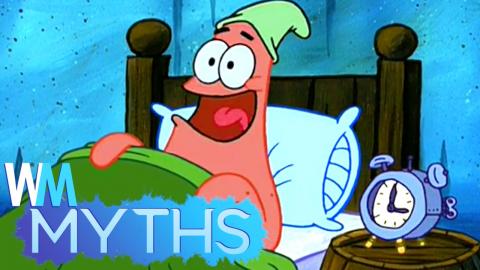Top 5 Myths About Sleep

From narcoleptic princesses to Rip Van Winkle, - tall tales and shuteye have a rich shared history. Welcome to WatchMojo's Top 5 Myths [...].
In today's instalment we're counting down the top five myths about sleep that kept us up all night.
#5: You Can Make Up For Lost Sleep
You might be able to catch up with old friends, but the Sandman isn’t one of them. If and when you find yourself having burnt the candle at both ends, sleeping longer than usual won’t do anything to counteract the damage you’ve done. One late night followed by an early bedtime the next might balance the scales, but if you’ve been consistently getting inadequate amounts of sleep - there’s no quick fix available. According to a study conducted by the Harvard School of Medicine, the ill-effects of prolonged sleep deprivation, such as diminished ability to focus, poor reflexes and weakened problem solving skills, will actually be worsened by any attempt compensate by oversleeping. You’re actually better off simply returning to a normal sleep schedule.
#4: One Long Period of Sleep Has Always Been The Norm
“A full 8 hours” is the modern standard of rest, but in recent years, alternative sleep patterns have started to attract more serious attention in the scientific community. And these theories have a history to back them up. In the past, biphasic sleep wasn’t an alternative, it was the norm. Two distinct periods of sleep, each lasting approximately 4 hours, were separated by a one to two hour period of wakefulness, in which people might do chores, read, catch up on correspondence or even socialise. With widespread artificial lighting however, we increased our productive hours and made sleep more efficient. That being said, when made to live by natural light again, participants in a 1990 study naturally returned to a biphasic sleep pattern.
#3: Naps Are A Waste Of Time
Cat-nappers rejoice! Science is here to defend your right to a quick bit of shuteye. Our modern, highly productive society might dismiss napping as a luxury of the lazy, but it serves a biological purpose. Naps between 10 and 90 minutes in length, when taken before 4pm, have been shown to increase productivity, heighten alertness, improve overall mood and even help the ol’ sex drive. While the contemporary workaholic might turn to coffee or energy drinks to keep them going throughout the day, such solutions only work to delay and worsen the inevitable effects of exhaustion. Many highly productive individuals, including Winston Churchill, Eleanor Roosevelt, Thomas Edison and J.F.K. all swore by the restorative power of naps to keep them at their best.
#2: Early Risers Are Better Off
You might be jealous of so-called “morning people”, but they aren’t necessarily better off, except in the court of public opinion. Thanks to one Christopher Randler, a biologist credited with the whole “early risers get more done” concept, morning people have been attributed with near superhuman productivity. But in reality, most early risers just experience their productive peak in the morning hours, before slowing later in the day. A night owl forcing his or herself to rise with the sun is unlikely to experience unprecedented levels of productivity. Their natural productive peak is probably in the late afternoon or evening. For maximum efficiency, people need to get enough rest (whenever that’s most natural for them), and then apply themselves to difficult tasks whenever most alert and focused.
#1: You Need 8 Hours
When it comes to sleep… there’s no magic number. It might sound like a foregone conclusion, but the only real rule is… “make sure you get the right amount”. Everyone has different needs, which will likely change throughout life. Teens and infants are likely to need more sleep, but one doesn’t necessarily require less as they get older - that’s a common misconception. Many adults think they can function on little sleep, when in reality, they’ve simply grown accustomed to living sleep deprived - negative side effects and all. Oversleeping is a real issue too - excess sleep has been linked with a variety of serious health concerns. The key to getting enough rest is self-awareness and learning to read the signs your body is giving you.
